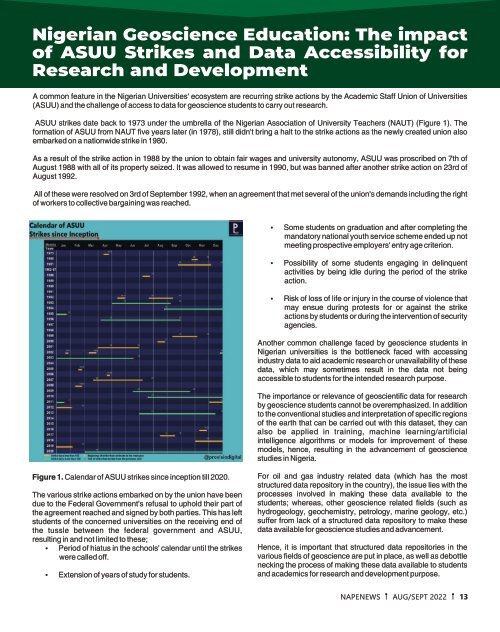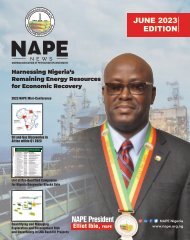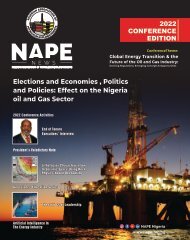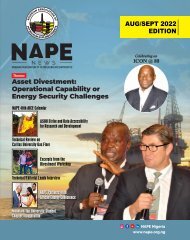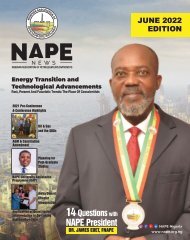You also want an ePaper? Increase the reach of your titles
YUMPU automatically turns print PDFs into web optimized ePapers that Google loves.
Nigerian Geoscience Education: The impact<br />
of ASUU Strikes and Data Accessibility for<br />
Research and Development<br />
A common feature in the Nigerian Universities' ecosystem are recurring strike actions by the Academic Staff Union of Universities<br />
(ASUU) and the challenge of access to data for geoscience students to carry out research.<br />
ASUU strikes date back to 1973 under the umbrella of the Nigerian Association of University Teachers (NAUT) (Figure 1). The<br />
formation of ASUU from NAUT five years later (in 1978), still didn't bring a halt to the strike actions as the newly created union also<br />
embarked on a nationwide strike in 1980.<br />
As a result of the strike action in 1988 by the union to obtain fair wages and university autonomy, ASUU was proscribed on 7th of<br />
August 1988 with all of its property seized. It was allowed to resume in 1990, but was banned after another strike action on 23rd of<br />
August 1992.<br />
All of these were resolved on 3rd of <strong>September</strong> 1992, when an agreement that met several of the union's demands including the right<br />
of workers to collective bargaining was reached.<br />
Ÿ<br />
Ÿ<br />
Ÿ<br />
Some students on graduation and after completing the<br />
mandatory national youth service scheme ended up not<br />
meeting prospective employers' entry age criterion.<br />
Possibility of some students engaging in delinquent<br />
activities by being idle during the period of the strike<br />
action.<br />
Risk of loss of life or injury in the course of violence that<br />
may ensue during protests for or against the strike<br />
actions by students or during the intervention of security<br />
agencies.<br />
Another common challenge faced by geoscience students in<br />
Nigerian universities is the bottleneck faced with accessing<br />
industry data to aid academic research or unavailability of these<br />
data, which may sometimes result in the data not being<br />
accessible to students for the intended research purpose.<br />
The importance or relevance of geoscientific data for research<br />
by geoscience students cannot be overemphasized. In addition<br />
to the conventional studies and interpretation of specific regions<br />
of the earth that can be carried out with this dataset, they can<br />
also be applied in training, machine learning/artificial<br />
intelligence algorithms or models for improvement of these<br />
models, hence, resulting in the advancement of geoscience<br />
studies in Nigeria.<br />
Figure 1. Calendar of ASUU strikes since inception till 2020.<br />
The various strike actions embarked on by the union have been<br />
due to the Federal Government's refusal to uphold their part of<br />
the agreement reached and signed by both parties. This has left<br />
students of the concerned universities on the receiving end of<br />
the tussle between the federal government and ASUU,<br />
resulting in and not limited to these;<br />
Ÿ Period of hiatus in the schools' calendar until the strikes<br />
were called off.<br />
Ÿ<br />
Extension of years of study for students.<br />
For oil and gas industry related data (which has the most<br />
structured data repository in the country), the issue lies with the<br />
processes involved in making these data available to the<br />
students; whereas, other geoscience related fields (such as<br />
hydrogeology, geochemistry, petrology, marine geology, etc.)<br />
suffer from lack of a structured data repository to make these<br />
data available for geoscience studies and advancement.<br />
Hence, it is important that structured data repositories in the<br />
various fields of geoscience are put in place, as well as debottle<br />
necking the process of making these data available to students<br />
and academics for research and development purpose.<br />
NAPENEWS AUG/SEPT <strong>2022</strong> 13


